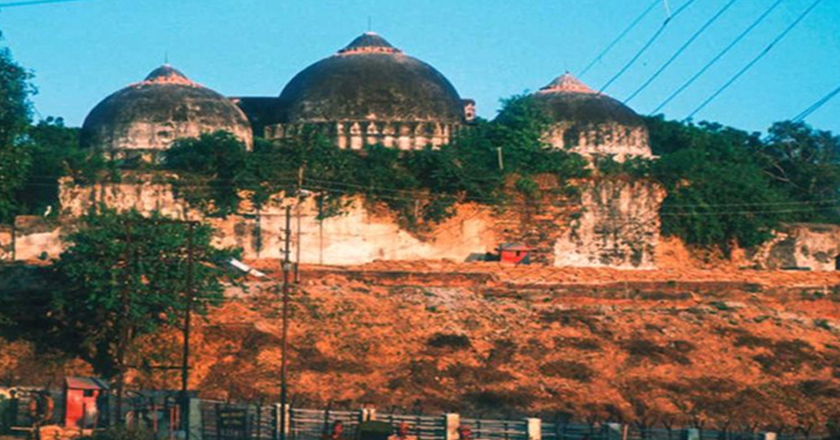- Muslims to appeal against CBI special court’s verdict
- Acquittals did not enhance stature of leaders
- Oral evidence by journalists, IPS officer not considered
- Rule of law takes yet another beating
- CBI lives up to its reputation of ‘caged parrot’
The CBI special court’s verdict on destruction of Babri Masjid, one of the worst communal outrages in the history of independent India, is yet another blow to the judicial, secular values and the rule of law. Truth and justice were buried once again under the debris of the 16th century mosque. It has been public knowledge that BJP veteran Lal Krishna Advani’s rath yatra was intended to incite communal frenzy for political gain. Advani and other BJP leaders such as Murli Manohar Joshi and Uma Bharti were very much present at the site of offence on the fateful 6 December 1992 encouraging the hooligans (respectfully called kar sevaks) to indulge in “egregious violation of the rule of law,” as the highest court of the land had put it. The CBI produced, working under different regimes over 28 years, as many as 351 witnesses and about 600 documents as evidence before the court. The court said, on Wednesday, that there was no evidence to believe there was a conspiracy behind the demolition.
Was it not a conspiracy?
Was it not a conspiracy to travel from all corners of the country to the disputed structure in thousands with iron crowbars, spades, hoes and ropes which were used in felling the mosque? Did not leaders of the BJP and the Viswa Hindu Parishad mouth slogans like “Ek dhakka aur do, Babri Masjid thod do?” What about the fiery speeches made by the proponents of the movement while the vandalism was afoot? And who were the beneficiaries of the act of destruction? Did not Advani say on the day of demolition that “it was the saddest day of his life?” After the judgment, the former deputy prime minister said his position and that of the BJP’s on Ram Janmabhoomi issue has been vindicated by the verdict. What does he mean? Was there any sign of remorse on the part of the veteran leaders of the party which reaped a huge political harvest after deliberately breaking the law? How can they be exonerated by the court disregarding the mountains of evidence? It is accepted that it is extremely difficult to prove a charge of conspiracy even when the probing agencies and the prosecution have best of intentions, sincerity and capabilities. We have a number of cases in Telangana and Andhra in which charges of murder were not proved due to lack of evidence (Karamchedu mayhem, Ranga’s murder, cases against Nayeem, etc.) When we have a politically hamstrung agency that has been working to please the political masters of the day, nothing better could be expected. However, the way the secular values and the democratic norms have been diluted in a methodical manner, one shudders to think about the future. Also Read: Crime of destruction of Babri committed, but who conspired?
Were there no celebrations?
The Lucknow court has acquitted Advani and 31 others of all the charges. Moreover, the court said those who were charged with the crime did, in fact, try to prevent the demolition of the mosque. The scenes of joyous celebrations distributing sweets were overlooked or were not proved by the CBI which lived up to its dubious reputation of being a “caged parrot,” the description given by the Supreme Court on some other occasion. The oral evidence given by scores of journalists and IPS officers was obviously ignored by the CBI court. The aftermath of the demolition in terms of Bombay riots and killings at many other places resulting in the death of at least 3000 persons was also not taken into account. Kalyan Singh, the then chief minister of Uttar Pradesh who did not keep the promise he made to the Supreme Court and to the National Integration Council that he would not allow anyone to touch the mosque was also let off without even a token punishment. The CBI court appears to have strictly gone by the fact that the prosecution did not present any tangible evidence that the demolition of the mosque took place as per a conspiracy. The judicial process would have taken three more decades to conclude had the SC not insisted on daily hearing by the CBI special court and ordered that the judgment should be delivered on or before 30 September 2020. Aslo Read: Advani, Joshi and 30 other acquitted
No great expectations, anyway
The way the Ayodhya land title dispute was settled by the apex court on 9 November 2019 in favour of the Hindu protagonists left people of the country with no great expectations from the CBI special court. The comment made by the SC on the demolition, at the time of judgment on the Ayodhya land title, gave a ray of hope that the culprits would be brought to book. In spite of the CBI court judgment, the demolition of the mosque would continue to be a festering wound for Indian democracy and the constitutional system. The acquittal did not enhance the reputation of the BJP veteran leaders in the eyes of the people of the country. That was perhaps why, the top leaders of the ruling party chose not to react to the judgment with enthusiasm or celebrations. The saga of Babri Masjid has not ended with the judgment. It would continue. Senior advocate and member of the All India Muslim Personal Law Board (AIMPLB) Zafaryab Jilani has said the verdict would be challenged in the high court. The burial of truth is a painful and time-consuming process since we continue to be a constitutional democracy with checks and balances, however feeble they are.





People are loosing confidence on Government agencies and doubting the consciousness of judges
People are doubting the sinciarty of Governent
agencies
courts must protect their indipendence